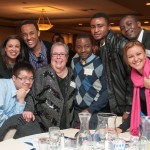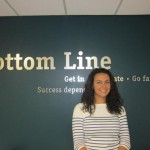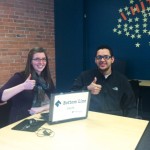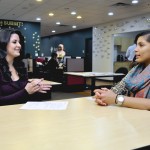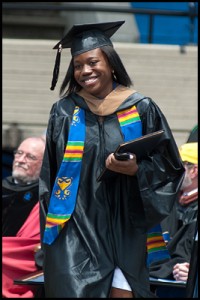This past February, I had the privilege of attending the annual “Share the Dream” banquet for students in the College Now/START program at UMass Dartmouth. Carol Spencer, Director of College Now Program, said that it is held every year to, “celebrate the success of the College Now/START Program.” The first-years are “officially welcomed into the University by receiving a certificate acknowledging their completion of the program.” Staff say that, “The Banquet is a wonderful way to celebrate and empower our students to continue striving.”
College Now/START is an alternative admissions program that supports students throughout their first year of college, by providing additional academic support and mentoring. Many Bottom Line students are enrolled in this program and have begun to see the benefits of taking a reduced course load and attending extra tutoring hours their first two semesters of college. There are currently 30 first-year students from Bottom Line in College Now/START Program, and 52 Bottom Line students have participated since 2009.
My student, Etiene, was asked to be one of two current College Now students who gave a speech at the banquet. In the days leading up to the event, he said that he was nervous and yet his speech was ready, thanks to the support of his College Now advisors and the Writing Center. At the “Share the Dream” banquet, Etiene brought the crowd of students, parents, faculty, administrators, and supporters to their feet! I could not have been more proud of him and was truly moved by his speech. Etiene was also awarded a $3,000 Talent-Merit Scholarship from College Now. It was a testament to his hard work this past semester.
I believe that alternative admissions and bridge programs at colleges are great options for hardworking and determined students who need more help preparing for college. UMass Dartmouth is not the only school with these types of programs. Students can often find summer programs or first year intensive programs that will help support their academic needs. Programs such as Passport at College of the Holy Cross, AID at Worcester State, OTE at Boston College, and PLUS at Framingham State are all great examples of alternative admissions or bridge programs.
Some students are discouraged or disappointed to find out they have been selected for such programs because they may have to take a reduced course load, spend a few weeks of their summer taking college classes or attend mandatory tutoring sessions. These students should be excited for such programs! Not only do they offer lots of academic support in order to succeed in the first year of college, but a chance to build stronger relationships with peers and school administrators with which many students to not normally get the chance to interact. Bridge programs help students gain comfort with the rigorous coursework found in many college-level classes and understand what the rest of their years in college will look like. Over 90 Bottom Line students from the high school Class of 2012 went on to attend bridge programs at Bottom Line’s target colleges. I love it when our students are able to take advantage of existing resources to better handle the transition to college and help them reach graduation.
– Kira Terrill
Success Counselor, Worcester
